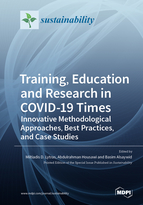Training, Education and Research in COVID-19 Times: Innovative Methodological Approaches, Best Practices, and Case Studies
A special issue of Sustainability (ISSN 2071-1050). This special issue belongs to the section "Health, Well-Being and Sustainability".
Deadline for manuscript submissions: closed (23 August 2021) | Viewed by 110690
Special Issue Editors
Interests: cognitive computing; artificial intelligence; data science; bioinformatics; innovation; big data research; data mining; emerging technologies; information systems; technology driven innovation; knowledge management; semantic web
Special Issues, Collections and Topics in MDPI journals
Interests: medical education; quality in training; innovation; saudi commission for health specialties; smart healthcare
Special Issues, Collections and Topics in MDPI journals
2. College of Medicine, King Saud Bin-Abdul-Aziz University for Health Sciences, Jeddah, Saudi Arabia
3. Urology Section, Department of Surgery, King Abdulaziz Medical City, Ministry of National Guard, Jeddah, Saudi Arabia
Interests: medical education; quality in training; innovation; saudi commission for health specialties; smart healthcare
Special Issues, Collections and Topics in MDPI journals
Special Issue Information
Dear Colleagues,
The recent pandemic of covid-19 challenges the delivery of training and education worldwide. In parallel, research in the times of covid-19 becomes more demanding in terms of research methodologies and the delivery of sound scientific contributions.
In this Special Issue we are interested in analyzing the diversified training, education, and research context in the times of the covid-19 pandemic. Our intention is to analyze the key implications of the modified online mode of delivery as well as the components of strategies and policies that enhance the social value and the social impact of training, education, and research.
Our intended contribution is multifold:
- To promote recent sound research on effective training, education, and research strategies and methodologies;
- To contribute to the body of knowledge by promoting sound methodological approaches for effective training, education, and research in covid-19 times;
- To communicate best practices and key lessons learned related to training, education, and research in the covid-19 period;
- To invite to the relevant scientific debate diverse communities from different domains of human activity including medical training and research, business training and education, information systems and computer sciences education, etc.
- To contribute to the discipline of training and education by synthesizing complementary approaches, limitations, and key findings.
Topics include but are not limited to the following:
- Training strategies in the covid-19 period;
- Effective technology for enhanced learning interventions in the covid-19 period;
- Transforming education from off-line to on-line paradigm in the covid-19 period;
- Research excellence and strategies in the covid-19 period;
- Enhancing the skills, competencies, and knowledge of trainees in the covid-19 period;
- Engagement, interaction, and active training and learning in the covid-19 period;
- Higher education best practices for delivering top-quality education in the covid-19 period;
- Case studies in medical training and research;
- Business training and education;
- Information systems and computer sciences education;
- Strategic frameworks for training, education, and research efficiency in covid-19 times;
- Key performance indicators and learning analytics for measuring the effectiveness of online training in the times of covid-19;
- Integration of academia and industry for training, education and research;
- Social networks research for enhanced training, education, and research in covid-19 times;
- Quality initiatives for effective training, education, and research in covid-19 times.
Prof. Dr. Miltiadis D. Lytras
Dr. Abdulrahman Housawi
Dr. Basim Alsaywid
Guest Editors
Manuscript Submission Information
Manuscripts should be submitted online at www.mdpi.com by registering and logging in to this website. Once you are registered, click here to go to the submission form. Manuscripts can be submitted until the deadline. All submissions that pass pre-check are peer-reviewed. Accepted papers will be published continuously in the journal (as soon as accepted) and will be listed together on the special issue website. Research articles, review articles as well as short communications are invited. For planned papers, a title and short abstract (about 100 words) can be sent to the Editorial Office for announcement on this website.
Submitted manuscripts should not have been published previously, nor be under consideration for publication elsewhere (except conference proceedings papers). All manuscripts are thoroughly refereed through a single-blind peer-review process. A guide for authors and other relevant information for submission of manuscripts is available on the Instructions for Authors page. Sustainability is an international peer-reviewed open access semimonthly journal published by MDPI.
Please visit the Instructions for Authors page before submitting a manuscript. The Article Processing Charge (APC) for publication in this open access journal is 2400 CHF (Swiss Francs). Submitted papers should be well formatted and use good English. Authors may use MDPI's English editing service prior to publication or during author revisions.
Keywords
- training
- education
- research
- medical education
- business education
- higher education
- technology-enhanced learning
- covid-19
- research excellence
- social networks in education
- trainee satisfaction







